News
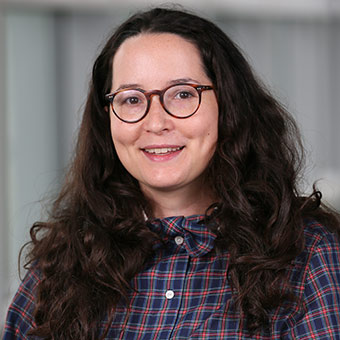
January 22, 2026
SciShow, a long-running science-focused YouTube channel with 8.3 million subscribers, recently visited Brandeis to film an episode of its new SciShow Field Trips project with Hannah Yevick, Assistant Professor of Physics, and Caroline Martin, a postdoctoral researcher in Yevick's lab. Yevick’s research includes study of the syncytiotrophoblast, a single, giant cell folded around the human placenta with a surface area that spans 13 square meters. She talked with SciShow about how her study of this cell is revealing new clues about how cells work in general, and how she was originally inspired to start looking at the mechanobiology of the placenta.

January 21, 2026
Maya Mancini, a fourth-year PhD student in the Sciolla Lab, has been selected as one of the 2025 recipients of The Office of Science Graduate Student Research (SCGSR) Program award. Supported by the Department of Energy (DOE), the SCGSR program provides funding for a small number graduate students to conduct part of their thesis research at a DOE National Laboratory.
Maya will spend the next year conducting research in collaboration with DOE scientists on next generation particle tracking technology.
Congratulations Maya!
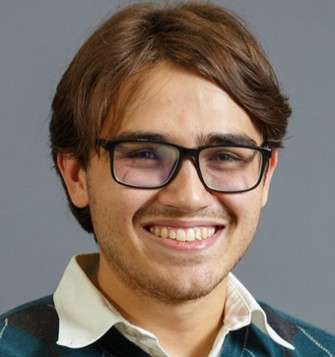
September 11, 2025
PhD student Mason Miguel's interview was recently featured on Brandeis's Graduate Studies in the Arts and Sciences page where he was asked about his experiences here. He emphasizes the small, close knit community that has continuosly fostered his academic and interpersonal growth. Now in his third year, he conducts research in Dr. Hannah Yevick’s lab, studying multinucleated cells called syncytia and how their cytoskeleton and adherence to different surfaces changes with respect to size.
Mason highlights the collaborative atmosphere, where students are able to interact with each other and advisors across all labs and departments. The relationships built go beyond the lab as they'd often go on excursions such as hiking trips in New England. Funded by the Cross-Disciplinary Molecular and Cell Biology grant, along with being connected to other researchers of different expertise, Mason is able to expand his growing network. As a Graduate Department Representative, he advises future physics PhD students to focus on building transferable skills, as a physics PhD opens doors to a wide range of career paths.
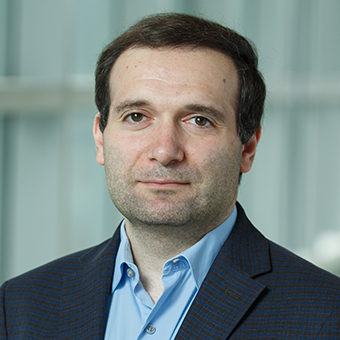
July 29, 2025
Professor Aram Apyan and his group on the ATLAS experiment at CERN are featured in a recent Symmetry article for the first detection of longitudinally polarized W bosons in Vector Boson Scattering processes at the Large Hadron Collider. “We want to study longitudinally polarized W boson pairs because they can interact with each other through an intermediary Higgs boson,” Apyan says. “It’s a really sensitive test of the Higgs mechanism.”
This new measurement is a significant milestone toward future studies of the scattering of longitudinally polarized W and Z bosons. The Brandeis team included Aram, his postdoctoral associate Daniel Camarero Munoz, and former graduate student Todd Zenger.
Related links:
The work has been published in Physical Review Letters (Editor's suggestion).
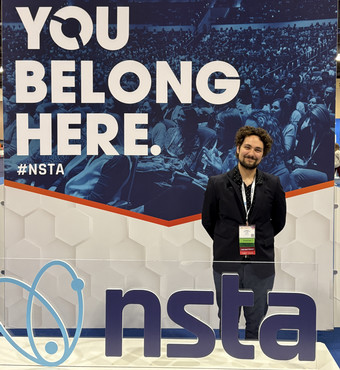
May 9, 2025
Greg Roitbourd, a Physics Undergraduate Departmental Representative, has been selected as one of the 2025–2026 American Physical Society (APS) Student Ambassadors. This prestigious program recognizes undergraduate and graduate students who demonstrate a strong commitment to science communication, outreach, and community engagement.
As an APS Student Ambassador, Greg will work to promote physics education and share APS resources with peers and the broader community through campus outreach and events.
Congratulations, Greg!
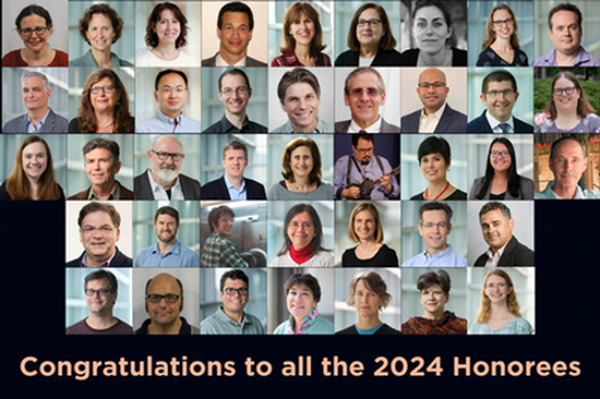
January 31, 2025
Bulbul Chakraborty and Peter Mistark have been recently selected as Brandeis's 2024 Career Heroes. This annual award is voted on by students and given to professors who have made a significant impact on the professional development of many students. Their contribution to the student body will undoubtedly propel students forward in their careers.
Congratulations, Bulbul and Peter!
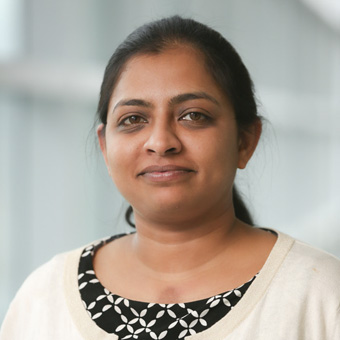
October 8, 2024
Aparna Baskaran was elected as an American Physics Society (APS) fellow in the Division of Soft Matter for "seminal contributions exploiting nonequilibrium statistical physics to elucidate the physics of active and granular matter." With no more than 0.5% of the Society's members being given this fellowship annually, this award is highly selective and indicative of her contributions to physics.
The American Physics Society (APS) has been awarding fellowships to those who contribute greatly to the advancement of the application of physics to science and technology through their innovative research and publications.
Congratulations, Aparna!
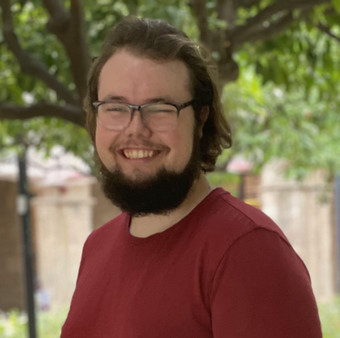
August 28, 2024
Michael Cardiff, a third-year physics doctoral student, has been selected as one the few recipients of the Office of Science Graduate Student Research (SCGSR) Award. This award is supported by the U.S. Department of Energy (DOE) through the Office of Science Graduate Student Research Program (SCGSR).
SCGSR allows graduate students to work alongside highly qualified scientists at the prestigious DOE National Laboratories to further advance their PhD thesis research.
Congradulations, Michael!
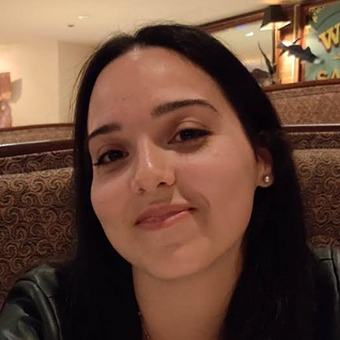
August 14, 2024
Brookhaven National Laboratory (BNL) has recently awarded the prestigious Goldhaber Distinguished Fellowship to former 2023 Physics graduate student Francesca Capocasa. This fellowship is highly selective for candidates who show great passion and drive towards their independent research. During her 3 year appointment, Francesca Capocasa will be working in the Instrumentation Department.
Congratulations, Francesca!
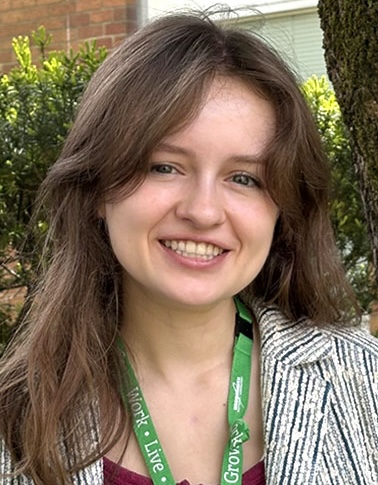
June 11, 2024
Brookhaven Women in Science (BWIS) has named Emily Duden of Brandeis and Kali Rigby of Yale as the recipients of the 2024 Renate W. Chasman Award. Duden and Rigby will each give a talk and receive their award at the Brookhaven National Laboratory (BNL) on Monday, June 17, at 12 p.m. and on Zoom.
Emily’s talk is titled “Building the future of particle physics with the new ATLAS Inner Tracker” and describes the work she did at BNL in the past year, while on a DOE SCGSR fellowship.
The Chasman Award is awarded annually to exceptional candidates in STEM to honor the memory and scientific contributions of the late Renate Chasman, a noted physicist at Brookhaven National Laboratory. Her work influenced the design of particle accelerators around the world, including Brookhaven’s National Synchrotron Light Source (NSLS) and its successor, NSLS-II, a DOE Office of Science user facility.
Congratulations Emily!
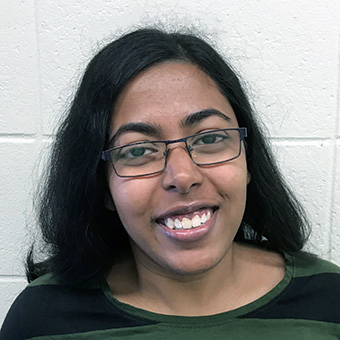
May 15, 2024
Rising sixth year physics doctoral student Kanaya Malakar received a Kavli Institute for Theoretical Physics (KITP) Graduate Fellowship. The Kavli Institute is a research institute at UC Santa Barbara, and the fellowship is aimed at giving graduate students a broader exposure to theoretical physics, since graduate students often specialize narrowly and lose the bigger picture.
Kanaya's research rocuses on active matter. She says that "life has been explored in a lot of fields, but for a long time we didn’t have the proper tools in physics to do so – now we’re moving towards that, and it’s becoming a more popular subfield. An experimental system using subcellular polymers was discovered at Brandeis to study active systems in the lab. I study theoretical models of a network of springs that mimic this polymer network. The beauty of such a theoretical model is that it is fairly simple, devoid of all the details of a cellular environment, and yet it allows us to understand in simple terms what controls certain mechanical properties of the cell."
Kanaya will be working with Dr. Boris Shraiman and Dr. Fridtjof Brauns on the mechanics of organismal development.
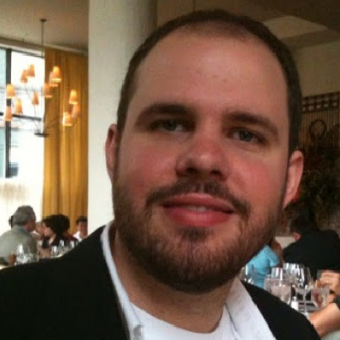
March 13, 2024
Professor Brian Swingle was awarded one of five Heising-Simons Foundation’s Science program grants for research focusing on theoretical and experimental projects on Informing Gravity Theory in the laboratory. These projects explore how the platforms and techniques of Atomic, Molecular, and Optical (AMO) physics can elucidate simple models of quantum gravity and inform the construction of more complex models applicable to the world we inhabit. Professor Swingle’s research has three main thrusts: information dynamics in black holes, fundamental bounds on quantum dynamics from gravity, and the emergence of geometry from entanglement.
Congratulations, Brian!
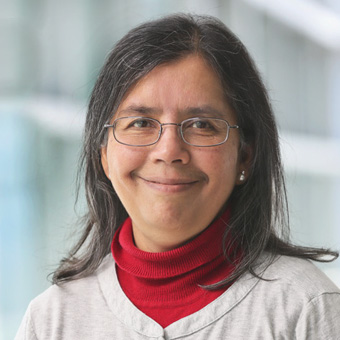
March 5, 2024
The Outstanding Referee program was instituted in 2008 to recognize scientists who have been exceptionally helpful in assessing manuscripts for publication in the APS journals. By means of the program, APS expresses its appreciation to all referees, whose efforts in peer review not only keep the standards of the journals at a high level, but in many cases also help authors to improve the quality and readability of their articles – even those that are not published by APS. The highly selective Outstanding Referee program annually recognizes about 150 of the roughly 91,600 currently active referees. Like Fellowship in the APS, this is a lifetime award.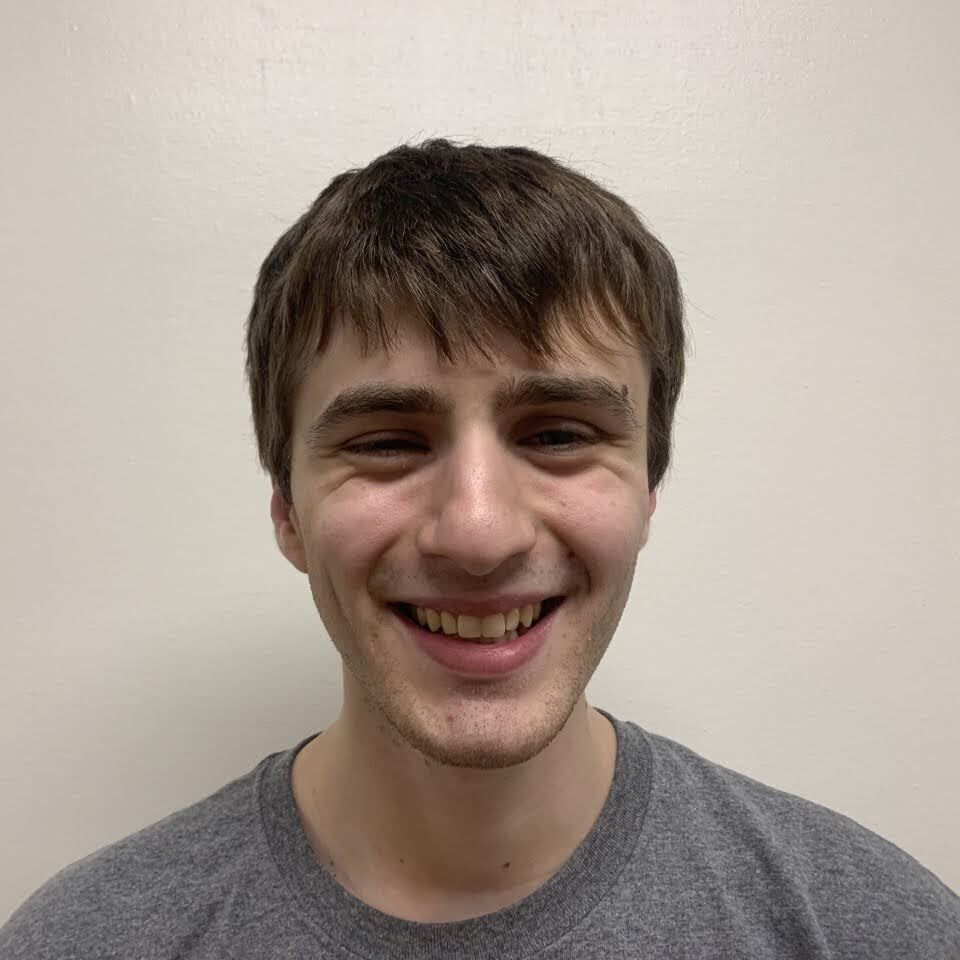
February 27, 2024
Former Brandeis Physics major Steven Tarr, BS '19, recently published in one of the country’s most prestigious Physics Journals - Physical Review Letters. His publication was featured both on the cover of the journal and as an Editors' Suggestion. His article, Probing Hydrodynamic Fluctuation-Induced Forces with an Oscillating Robot [journals.aps.org], explores dynamics of an oscillating, free-floating robot that generates radially expanding gravity-capillary waves at a fluid surface. Steven is currently a fifth-year graduate student at the Georgia Institute of Technology School of Physics.Steven speaks highly of his time at Brandeis. "My Brandeis experience was a highlight of my young adult life, and I owe much of that sentiment to my time in the School of Physics. Through countless hours in the Abelson building studying for classes, conducting research with Dr. Bulbul Chakraborty, and celebrating good times with peers, I built many lasting friendships and developed into the scientist and educator that I am today. At the time, I thought the Brandeis physics curriculum was the norm. Having now spent over four years of graduate study at the Georgia Institute of Technology, I realize that the faculty and staff at the Brandeis School of Physics uniquely prepared my peers and me for life in academia beyond the bachelor's degree. I certainly would not describe my time at Brandeis as easy, but the great academic rigor and equally great kindness I experienced were invaluable. I strive to carry these traits with me and emulate those to whom I owe so much as I continue on my journey to become a physics professor."
Congratulations Steven!
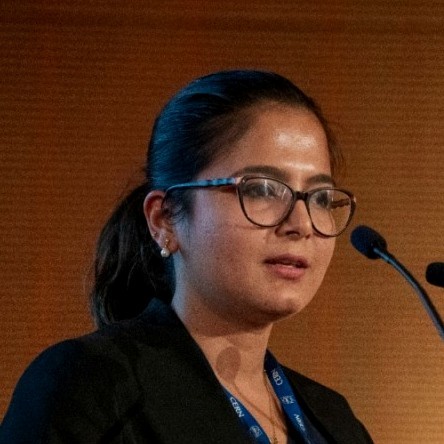
January 23, 2024
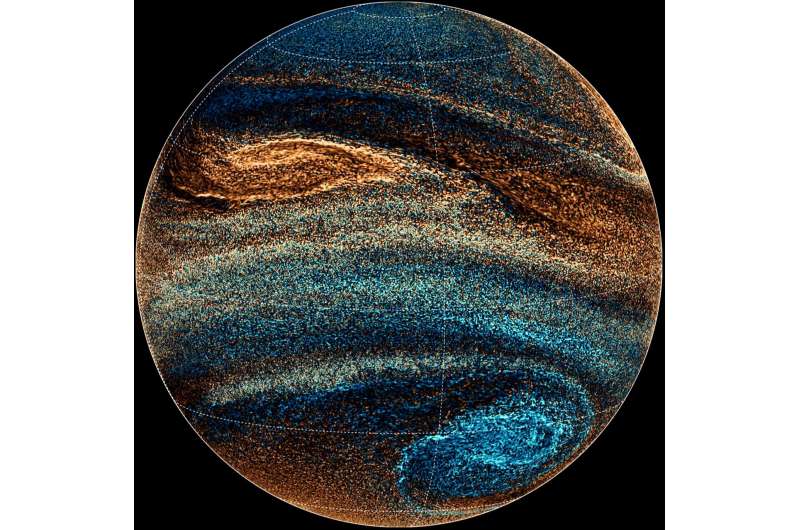
December 7, 2023
A paper by Professor James Cho and collaborators was published and appeared on the cover of Physical Review Letters. The work describes results from state-of-the-art, high-resolution supercomputer simulations which show repeated formation of a quartet of superstorms (planetary-sized cyclones, or hurricanes) on exoplanets known as hot-Jupiters. The simulations utilize new information obtained with the James Webb Space Telescope and show that the range of weather and climate on exoplanets are much broader and more dynamic than previously thought. This work has been actively highlighted by the news media.
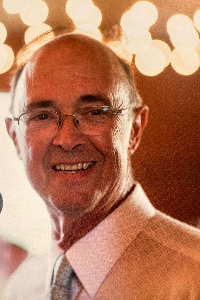
November 28, 2023
Brandeis Physics Faculty Emeritus Bob Meyer passed way on November 17, 2023. Bob joined Brandeis University as an associate professor in 1978 and was promoted to a full professor in 1985. At Brandeis, Bob was the founding director of the Brandeis Materials Research Science and Engineering Center in 2008. He articulated the philosophy of the Center, which recognizes that advances in materials science and biology have become increasingly intertwined, with progress in one field influencing the other. The Center has prospered following his retirement in 2012 by adhering to his vision.
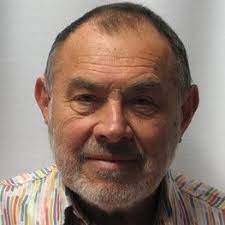
May 1, 2023
Brandeis Professor Emeritus of Physics Stanley Deser passed away in Pasadena CA on Friday April 21, 2023. He joined the faculty of the Physics Deptartment at Brandeis in 1958, where he remained until he retired in 2005. Stanley was a towering figure in theoretical high energy physics, classical gravity, and quantum gravity.
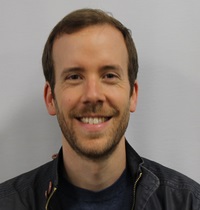
April 27, 2023
The Michael L. Walzer '56 Award for Teaching is given annually to a tenure-track faculty member who combines superlative scholarship with inspired teaching. A student noted that "Professor Rogers manages to understand the demographic of the course of mostly biology and/or pre-med students and still inspire interest in the subject and not discourage students with complex study material. The way he teaches is phenomenal."
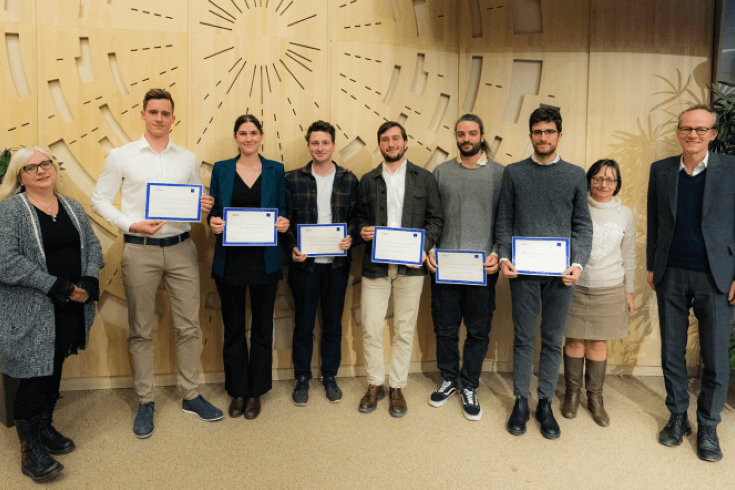
February 21, 2023
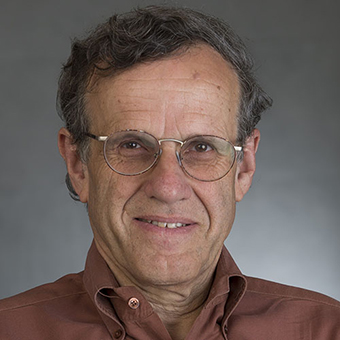
January 18, 2023
Rosner is an eminent theoretical physicist and the new 2023 APS President, and his love for the field stretches back to childhood. “I loved puzzles; I always read science articles, books,” he says. He earned his bachelor’s degree in physics from Brandeis and his doctorate from Harvard and has been at the University of Chicago since 1987. He doesn't remember a time when he didn't love science. He notes that majoring in Physics at Brandeis "was an amazing experience for me."
See his APS February 2023 interview here.

April 29, 2022
On Friday, April 29, a portrait of Albert Einstein by Ukrainian Artist Tetyana Kolechko will be hung in the Abelson hallway. This portrait was generously donated by Dr. Natalya Proskura and Vladislav Shapiro (MS '93). Their son Michael Proskura is a member of the Brandeis Class of 2024.
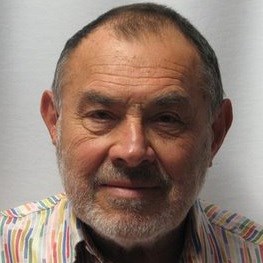
May 6, 2021
Brandeis Professor Emeritus of Physics, Stanley Deser, has been elected as a Foreign Member to the Royal Society. The Royal Society is a fellowship of many of the world's most eminent scientists and is the oldest scientific academy in continuous existence. Its fundamental purpose is to recognize, promote, and support excellence in science and to encourage the development and use of science for the benefit of humanity.
Deser is one of about 180 current Foreign Members in all fields of science. In addition, he is one of only four theoretical physicists elected.
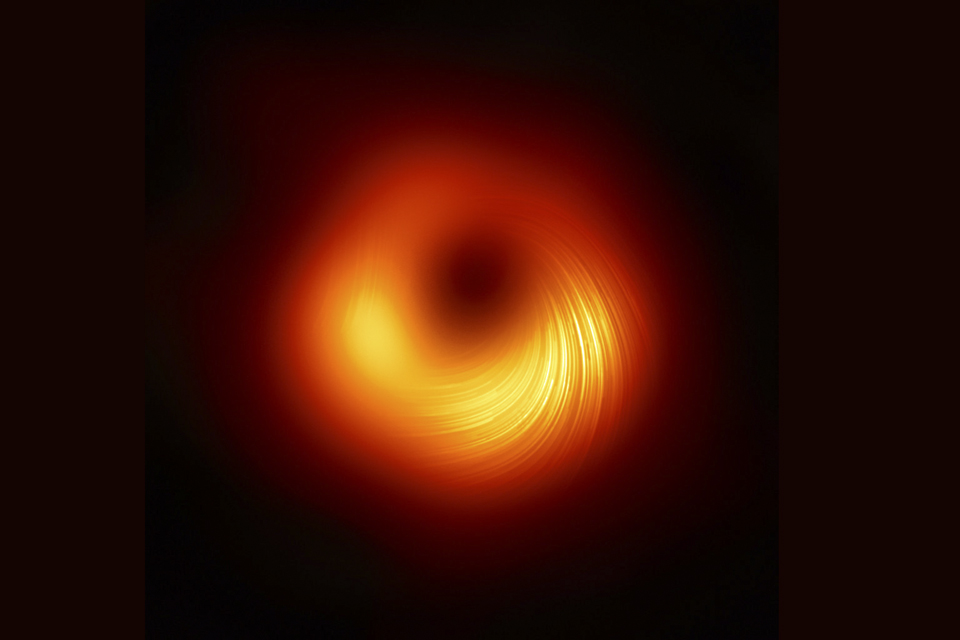
Photo Credit: EHT Collaboration
March 24, 2021
Professor John Wardle explains the significance of a new image of a black hole's magnetic fields.
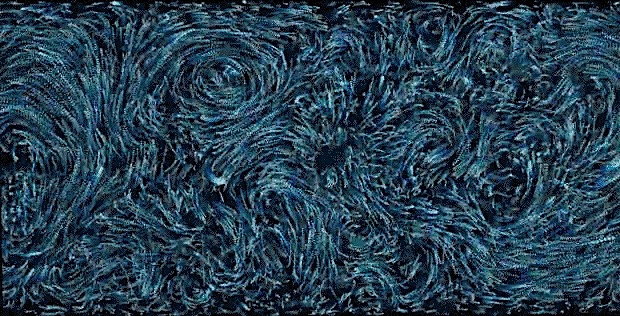
February 18, 2021
Researchers at the Brandeis Materials Research Science and Engineering Center (MRSEC), led by Guillaume Duclos, Seth Fraden, Michael Hagan and Aparna Baskaran, are harnessing the power of swirling cellular proteins to create self-propelling fluids.
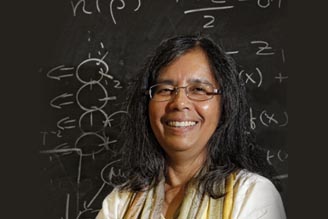
November 24, 2020
Brandeis physicist Bulbul Chakraborty has been named a Fellow by the American Association for the Advancement of Science, the world’s largest general scientific society.
Chakraborty, the Enid and Nate Ancell Professor of Physics and head of the Division of Science, received the prestigious recognition for important theoretical contributions to diverse areas of condensed matter physics, particularly disordered systems including frustrated magnets and granular materials.
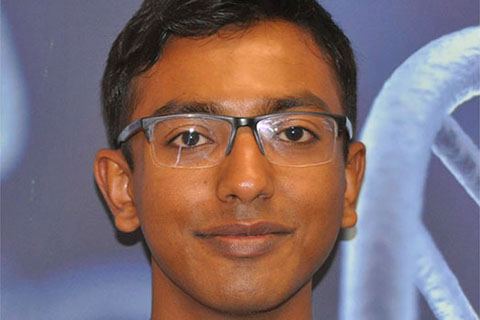
Photo Credit: Los Alamos National Laboratory
October 7, 2020
Sarkar, who received his PhD working with Professor Bulbul Chakraborty, is the recipient of the 2021 Irwin Oppenheimer award from the American Physical Society. Prsently, he is a postdoctoral fellow at the Center for Nonlinear Studies, Los Alamos National Laboratory.
The award recognizes outstanding contributions to physics by early career scientists who publish in Physical Review E (PRE). The citation that will appear on the certificate is: “For developing a theory of the emergence of self-replication in simple chemical models, and the definition of general design principles for constructing self-replicating objects.”
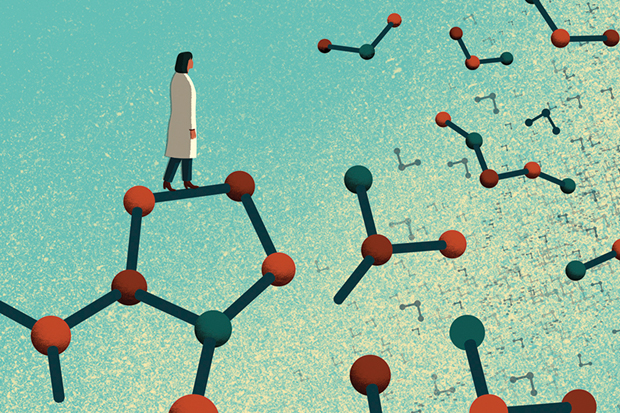
MRSEC harnesses the power of organic matter to develop new materials and machines.
July 14, 2020
Brandeis' MRSEC program, which is developing revolutionary new types of nano-sized machines and materials, has received an $18 million, six-year grant from the National Science Foundation.
It is the third time Brandeis has received the prestigious award. This year it was given to only 10 other universities besides Brandeis, including Columbia, Harvard and Princeton.
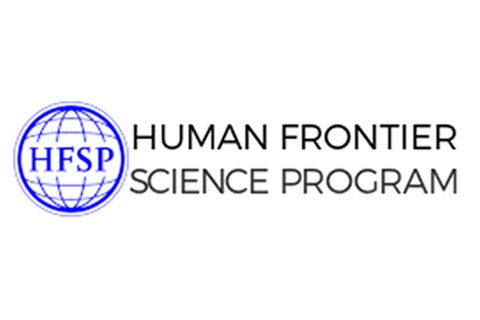
April 2, 2020
Professor W. Benjamin Rogers has been awarded a 2020 Human Frontier Science Program (HFSP) collaborative Program Grant to create a self-propagating synthetic cell. The HFSP Program Grants aim to tackle big questions in the life sciences by supporting and bringing together researchers with different backgrounds from different countries.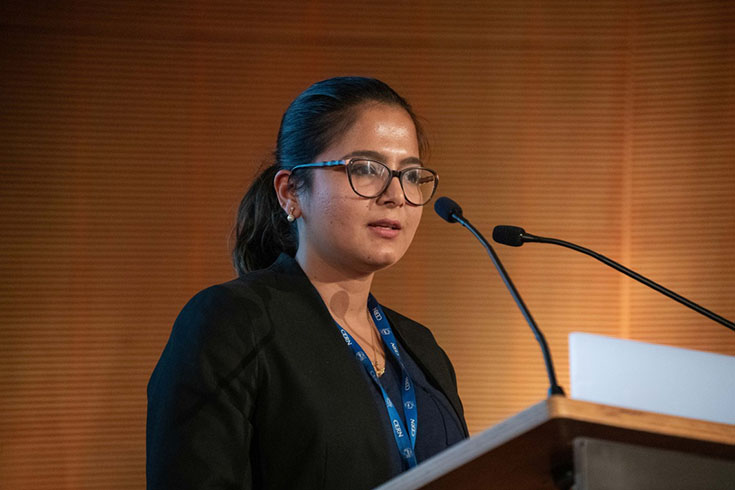
Photo Credit: CERN
March 27, 2020
Prajita Bhattarai, a Physics graduate student who spent last summer at CERN, has received an ATLAS PhD grant to allow her to focus on her research measuring Higgs-boson decays into four-lepton final states.
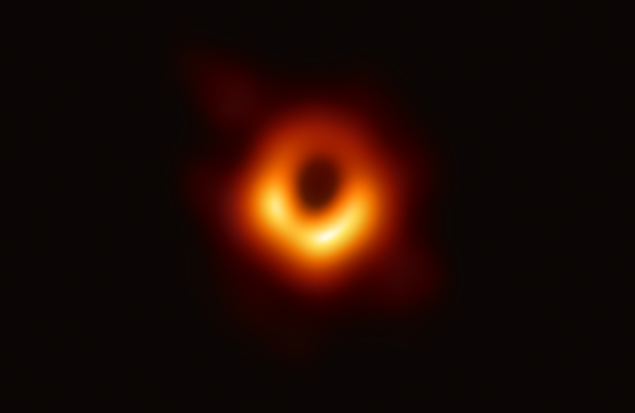
Photo Credit: Event Horizon Telescope Collaboration
October 2, 2019
Professor of astrophysics John Wardle, an expert on radio astronomy, is part of the consortium that captured an image of a supermassive black hole for the first time in history.
Photo Credit: Event Horizon Telescope Collaboration
April 10, 2019
Scientists have obtained the first image of a black hole, using Event Horizon Telescope observations of the center of the galaxy M87. Physicist John Wardle, who was part of the team that produced the image, explains why it's a major scientific breakthrough.
February 19, 2019
Brandeis University has received a $20,000 grant from the Association of American Universities (AAU) to complement and enhance current efforts at the university to foster student success in STEM.
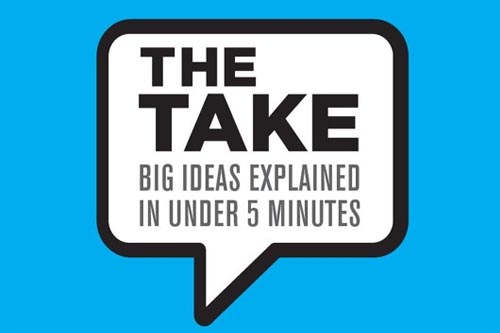
January 18, 2019
Brandeis physicist Seth Fraden explains what active matter is and how it can be used to create machines and materials that behave like living organisms.
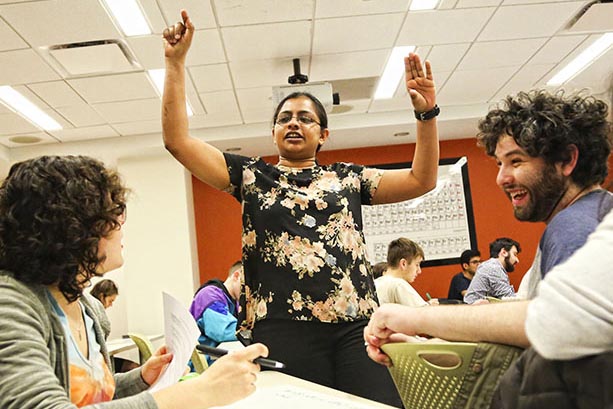
November 20, 2018
Associate Professor of Physics Aparna Baskaran has won a 2019 Early Career Award for Soft Matter Research from the American Physical Society.

November 16, 2018
Matthew Headrick explains what a mind-blowing theory in physics, the idea that the universe is a hologram.

October 12, 2018
We don't know for sure because we've never been able to take a picture of one. That may all be about to change.
July 25, 2018
The Provost's Office has announced this year's recipients of the Provost Research Awards, given to support innovations in teaching and research at Brandeis. Physics awardees include:
Baptiste Blanc (Physics), "Chemo-mechanical gel actuated by an oscillating chemical reaction"; An Huang (Mathematics) and Bogdan Stoica (Physics), "Physics from the primes"; Shashank Shekhar (Biochemistry, Biology, Physics), "Developing Stentor coeroelous as a new model organism to study the physical basis for evolution of multicellularity and organismal size-regulation."
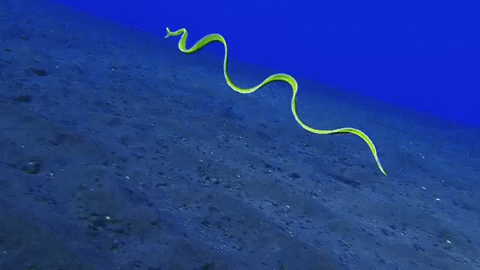
June 8, 2018
Physicist Seth Fraden is developing a new generation of machines modeled on living creatures. His latest invention might one day treat disease by swimming its way through our blood.
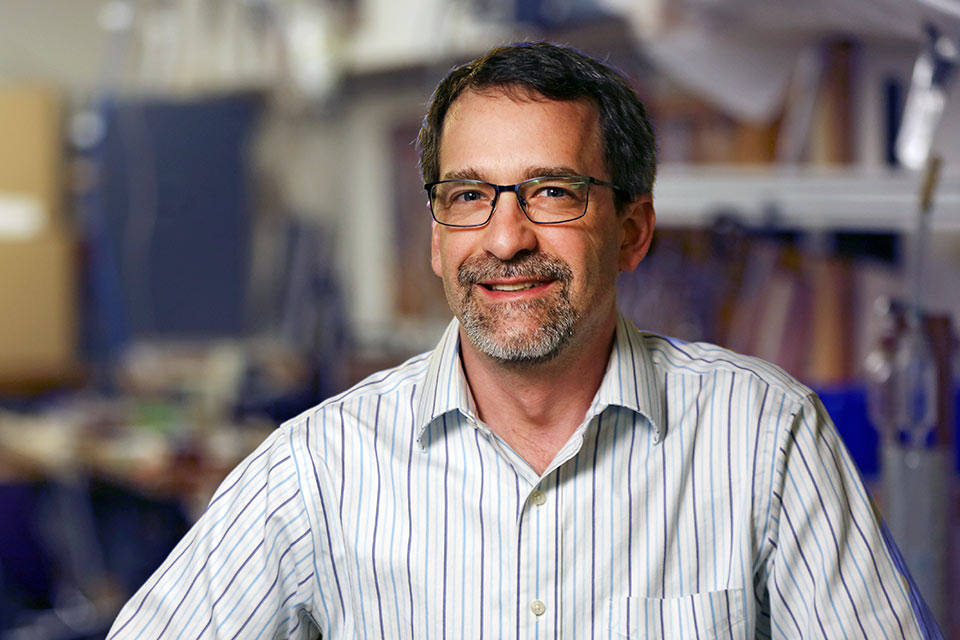
Summer 2018
Professor of Physics Matthew Headrick researches one of the most cutting-edge ideas in theoretical physics. It proposes that the universe is a three-dimensional image projected off a two-dimensional surface, much like a hologram emerges from a sheet of photographic film.

April 4, 2018
Enid and Nate Ancell Professor of Physics Bulbul Chakraborty has received a prestigious fellowship in theoretical physics from the Simons Foundation in New York.
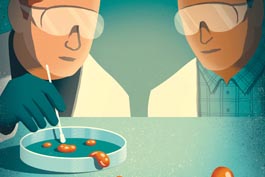
Summer 2017
Under a $20 million Materials Research Science and Engineering Center grant, Brandeis physicists are creating “active” matter that could one day animate self-healing artificial organs, drug-delivering nanobots and self-mending clothes.